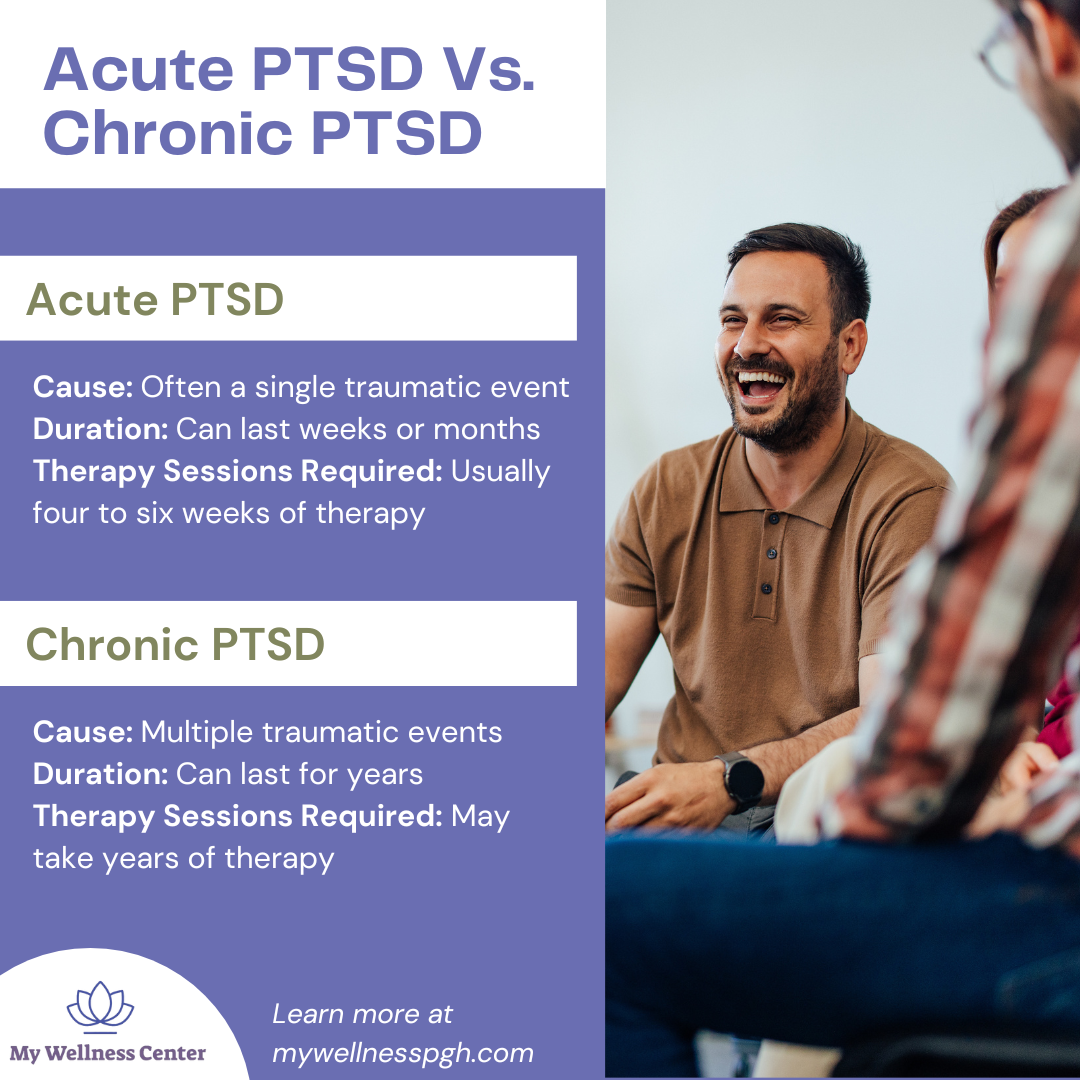PTSD is a serious mental health issue. If you think you’re at risk of hurting yourself or attempting suicide, call 911 or the suicide lifeline at 988.
PTSD—post-traumatic stress disorder—is a debilitating mental health condition that frequently emerges after witnessing or experiencing a traumatic event or series of events.
Although PTSD has been discussed for hundreds of years among soldiers who’ve fought in battles, it’s just as common in everyday life.
Children of abusive homes, victims of sexual assault, passengers in deadly car crashes—anyone who suffers a traumatic event could eventually suffer from PTSD.
PTSD is commonly separated into two types: acute PTSD and chronic PTSD. Understanding the differences between acute PTSD and chronic PTSD can help individuals seek proper care and treatment for their mental health struggles.
Use the table of contents below to learn more:
Table of Contents
Acute PTSD Vs Chronic PTSD: Differences At A Glance
What Is Acute PTSD?
Symptoms of Acute PTSD
Treatment For Acute PTSD
What Is Chronic PTSD?
Symptoms of Chronic PTSD
Treatment For Chronic PTSD
Find Support for PTSD
Acute PTSD Vs Chronic PTSD: Differences At A Glance
Here are the biggest differences between acute PTSD and chronic PTSD:
- Acute PTSD is usually caused by a single trauma event, lasts for a few weeks or months, and generally only requires four to six therapy sessions, though more could be needed.
- Chronic PTSD is caused by multiple trauma events, can last for years, and could take multiple years of therapy sessions.

What Is Acute PTSD?
Acute PTSD is an “immediate” psychological and physical response to a traumatic event—though the response could take anywhere from two days to four weeks to appear.
Although any traumatic event could lead to acute PTSD, some of the most common causes we see include:
- Assault
- Car Accident
- Birth Trauma
- First Responder Incidents
- War or Battle
- Loss Of A Loved One
Symptoms of Acute PTSD
Symptoms of acute PTSD can vary from person to person, but symptoms may include:
- Intrusive thoughts: Recurrent, unwanted memories of the traumatic event that are difficult to control.
- Upsetting flashbacks: Vivid, distressing relivings of the trauma, making it feel as if the event is happening again.
- Nightmares: Disturbing dreams related to the traumatic event, often causing sleep disturbances.
- Avoidance of reminders or events: Efforts to avoid places, people, or activities that trigger memories of the trauma.
- Negative mood: Persistent feelings of sadness, hopelessness, or irritability, often accompanied by a loss of interest in previously enjoyable activities.
- Reactivity: Heightened startle response, difficulty concentrating, and being easily startled or frightened.
- Feeling numb: Emotional numbness or a sense of being detached from one’s emotions and surroundings.
- Feeling detached: A sense of being disconnected from oneself or others, often leading to isolation and difficulties keeping or maintaining relationships.
- Reduced work or school performance: Individuals suffering from acute PTSD may struggle to focus, leading to difficulties at work or school.
- Reduced interest in favorite activities: Hobbies and activities that once brought you joy may now feel dull, tedious, or uninteresting.
Treatment For Acute PTSD
Unlike chronic PTSD, acute PTSD may only require a handful of therapy sessions, meaning someone may be ready to discontinue therapy after as few as four or six sessions.
Some of the most common treatment methods we use for acute PTSD in our offices include:
1. Coping Skills – Developing coping skills involves learning techniques to manage stress and anxiety, such as mindfulness, relaxation exercises, and problem-solving strategies. These skills empower individuals to handle distressing situations more effectively and reduce the impact of PTSD symptoms on daily life.
2. Talk Therapy – Talk therapy, also known as psychotherapy, provides a safe space for individuals to express their thoughts and feelings about the traumatic event. Through guided conversations with our therapists, you can gain insights, process emotions, and develop healthier thinking patterns to overcome PTSD.
3. EMDR – EMDR stands for Eye Movement Desensitization and Reprocessing, and it’s a form of therapy that brings your body and mind together to quickly transform negative thought processes, and it has become a leading treatment method for trauma and trauma-related disorders.
What Is Chronic PTSD?
Sometimes called “complex PTSD” for its multi-layered nature, chronic PTSD often stems from multiple traumatic events, many of which could be linked together.
Someone who has been in an abusive relationship, for example, may suffer from chronic PTSD as a result of dozens or hundreds of instances of abuse over multiple years.
In many cases, individuals with chronic PTSD may have a history of experiencing cycles of trauma events. Whether it’s an abusive relationship, drug issues, or living in a war zone, these people often live in an environment where they struggle to remove themselves from the traumatic experience, which then repeats over and over and over again.
Worse, some people locked in this cycle become hopeless. Instead of searching for solutions, they become convinced that change is difficult and that it’s better to live with the evil they know than to expand into new territory.
This isn’t true, of course. It is always better to seek positive mental and physical health outcomes.
Symptoms of Chronic PTSD
Chronic PTSD frequently features the same symptoms of acute PTSD, but complex PTSD may also include:
- Feelings of worthlessness
- Feelings of shame
- Feelings of guilt
- Problems controlling emotions
- Difficulty connecting with people
- Trouble keeping friends and partners
- Memory loss
Treatment For Chronic PTSD
While acute PTSD can often be managed in a handful of therapy sessions, chronic PTSD could take two to seven years of consistent therapy sessions.
The reason comes down to time. You’ll need time to:
- get to the root of the problem
- understand the therapy process
- reflect and grow
Most importantly, you have to want to change—which isn’t always the case for individuals suffering from chronic or complex PTSD.
When treatment does begin, you and your therapist might explore a variety of options, including:
1. Cognitive Processing Therapy (CPT): CPT helps individuals reframe negative thoughts about the trauma. By challenging and changing harmful beliefs, patients can reduce the emotional pain associated with the trauma and improve their overall mental health.
2. EMDR: As with acute PTSD, EMDR can be transformational in helping individuals reprocess traumatic memories and reduce their emotional impact. Learn more in What Is EMDR Therapy?
3. Group Therapy: Sharing experiences with others who have similar struggles can provide support and reduce feelings of isolation. Group therapy allows individuals to learn from each other’s experiences and coping strategies.
4. Mindfulness and Stress Reduction Techniques: Incorporating mindfulness practices such as meditation, yoga, and deep breathing exercises can help individuals manage stress and improve emotional regulation.
5. Lifestyle Changes: Encouraging healthy lifestyle habits, such as regular exercise, a balanced diet, and sufficient sleep, can have a positive impact on mental health. These changes can enhance overall well-being and resilience.
6. Support Systems: Building a strong support system of family, friends, and mental health professionals is crucial. Having a network of supportive individuals can provide encouragement and assistance throughout the recovery process.
7. Medication: Antidepressants and anti-anxiety medications can be prescribed to help manage symptoms. These medications can provide relief from the intense feelings of anxiety, depression, and insomnia that often accompany chronic PTSD.
Find Support for PTSD
If you’re ready to manage your PTSD, contact us. Our team of Pittsburgh PTSD therapists is standing by to help you process your trauma and begin living life to the fullest.

